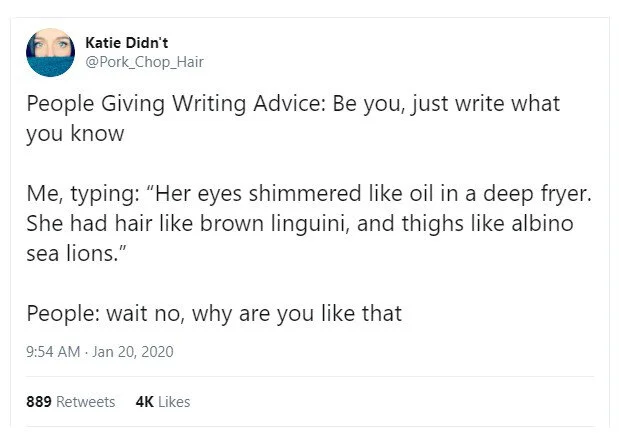Should You Only Write What You Know?
There are a lot - a lot - of voices in the “writing advice” category. Mine being one of them. I try not to be all stuffy and preachy and teachery because lawd knows there’s enough of those out there. I’m not in this for anything other than sharing what I’ve learned over a long career. If one person reads something and is like, “Holy shit! Ding! Ding! Ding!” that’s enough for me. Because when I started out, I needed to find that, too. I needed advice and guidance because I was serious about learning the craft of screenwriting which was so vastly different in execution than had been ingrained in me with “traditional” creative writing.
But, like with anything, a lot of voices mean different opinions. And I stress this a lot because they are just that - opinions. One of the main debates about writing I always come across is: Write what you know. Some say do it. Some say don’t. Sometimes we find comfort zones and stick to them. Sometimes we need to push and explore. I’m with the latter group.
We are writers. We are writers for a reason. Our brains are put together differently. As artists, we see the world around us in living color, noticing minute details about random things that others overlook. Our imaginations carry us; from childhood to adulthood we never lose our sense of wonder. And that’s pretty fucking awesome, right?
To put it in the simplest terms possible: Have you read Harry Potter or watched Star Wars? Pretty sure Lucas and Kasdan weren’t looking out the window or taking a stroll around the Death Star when they came up with the idea.
I mean, if I only write what I know it will mostly be about cheese and whiskey and cake and, randomly, cows. Not that there isn’t a market for that.
My brilliant and hilarious friend, Katie, underlined this point in a tweet. If we only write what we know, we’d have some pretty boring books and movies on our hands. Unless you’re, like, an astronaut or one of those guys who films honey badgers or a bad bitch or a SEAL or something. But you get my meaning. We were gifted with extraordinary imaginations, we should use them. People want to be transported from their every day lives when they read a book or watch a movie. It’s up to us to provide that escape.
Should you use what you know when you’re writing? Absolutely. There are aspects to all genres of writing that we intrinsically know. Get your foundation and build from there. You will find universal truths even in fantasy. That’s how we can set aside our beliefs and get carried away into a new world. Friendship, loyalty, family dynamics, societal issues, politics, enemies - these can all be found. They are life. How you choose to portray them and mold them are completely up to you.
We use everyday occurrences whether subconsciously or not. Have a fight with your spouse? Maybe your characters fight. Those characters being the pilot and captain of a space ship. Wanted a pony when you were ten but never got one? Use that longing for unrequited love. Use that disappointment. Pissed at your dad? New character - Darth Vader.
Let your imagination take you as far and wide as you can. But, make sure it’s grounded somewhat in reality to keep your readers hooked and their minds suspended. I may like whiskey but I wouldn’t know the first thing about running a backwoods still. As much as we’d like to believe, we don’t know everything so it’s important to learn before we write. Use your feelings, your unique experiences, your life, the world around you as a guide.
I’m a white woman. I believe wholeheartedly that we need more diversification in books and movies - from main and secondary characters to authors and screenwriters (and directors). For me, how can I write an African American or Latino character while consciously staying away from stereotypes without looking around my world? I can’t. I have to look to friends and neighbors and people I interact with, and open a dialogue. I don’t want one-dimensional characters so I need to seek out other voices.
Use what you know as a tool but also think about what you want to know. If you’re invested in your story and characters, it will flow naturally in your writing and storytelling making sure your readers will be invested, too.









